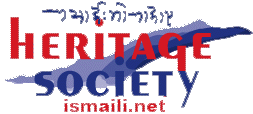
(1889- 1959)

| Tajddin, Mumtaz Ali Sadik Ali: 101 Ismaili Heroes, Vol.1, Islamic Book Publisher, Karachi, January 2003, p 188 |
 |
(1889- 1959) |
 |
|
Hooda Vali Mohammed Nanji was the son of Nanji Amarsi, a well-known
religious man. Nanji Amarsi passed most of his lifetime in Limadi and also went
to live in Pretoria. He had taken due care of the religious and secular
education of his son, Vali Mohammed. He died at the age of 73 years on August
28, 1933. His son, Vali Mohammad Nanji Hooda, known as V.N. Hooda was born in
Bombay in 1889. Nothing is known of his early life. He was however a
well-educated and a learned scholar, teacher and editor. V.N. Hooda’s appearance in the arena of the community service began in 1915, when he joined the religious night school as a teacher in Kandi Mola, Bombay, which was established in 1910 with Master Kanji Mitha Jivan as an honorary teacher. He observed that the students wasted their time after leaving the school in the evening, and that they should continue the religious activities. He emphasized upon the need of a library to the students of higher classes. Hussain Mukhi Poonja Jasraj and Ghulam Hussain Sidu, two young students, who were ardent juveniles in their teens, started a small library with 20 books at their home and enrolled the membership of the students who left the school after completing the course. V.N. Hooda encouraged them and found what he actually expected from the outgoing students. When the members increased with the collection of books, these two students who managed the affairs, needed a cupboard to be kept in the hall of the school, which he arranged for them. Meanwhile, Mawji Nur Mohammed Kabani came from Rangoon and joined them. Later on, Jaffer Ali Alibhai Parshotam also joined its managing committee. This library emerged as the Kandi Mola Ismailia Students Library on May 10, 1918 with the President Murad Ali Ghulam Hussain Naginwala. V.N. Hooda continued to serve it till he became its Supervisor on June 17, 1928. In its annual function organized by Mukhi Laljibhai Devraj (1842-1930) and presided by Mukhi Megji Mulji (1861-1932) on April 28, 1918, the Religious School for Kandi Mola glorified the valuable services of V.N. Hooda and awarded him a gold moon. He was a journalist and a writer. He worked in the “Ismaili Aftab,” “Ismaili”, “Ismaili Satpanth Prakash” and “Aina” as an editor. V.N. Hooda also served the Fidai Academy and Orphanage since its inception on December 13, 1928 as an Honorary Supervisor. It will be worthwhile to mention that V.N. Hooda was the first to translate few ginans into English for the research works of Prof. W. Ivanow (1886-1970), who reproduced them in his book, “Collectanea” (Holland, 1948). W. Ivanow writes in his preface that, “With regard to the present volume in particular, its nucleus is formed by translation of a representative collection of specimens of the so far almost completely unknown literature of Satpanth, or Indian Ismailism. For many years I tried to induce my Ismaili friends to do something on such lines, but various attempts usually were abandoned very soon, never attempting fruition, until the task was undertaken by Mr. V.N. Hooda.” W. Ivanow (pp. 2-3) also remarks, “A representative selection of either whole works or extracts has been translated into English by a Khoja specialist, Mr. V.N. Hooda, as published further here. This, through forming only a small portion of the whole Satpanth literature, nevertheless, supplies sufficient materials to permit us to assess its general outlines, and arrive at some conclusions. As far as I know, this is the first occasion on which translations from the original ginan literatures have been published.” V.N. Hooda also served in the Supreme Council for Kathiawar, Kathiawar Educational Central Board, H.H. The Aga Khan Volunteer Corps, Ismaili Central Board of Education, Ismailia Scholarship Committee, etc. He was the founder of the Kandi Mola Boys Scouts Group, and was the first person to have introduced the scouting activities in the Indian Ismaili community. He was also an Ex-Lt. of the Volunteer Corps, the Manager of the Khoja Sindhi Press, an Honorary Head Master of Kandi Mola Religious Night School, the founder of the Kandi Mola Pani Company, Honorary Supervisor of The Kandi Mola Ismaili Students Library, the member of the Managing Committee of Fidai Academy and Fidai Girls Education Institute, the Manager and the Supervisor of the H.H. The Aga Khan’s Central Education Board’s Scholarship Committee, Honorary Secretary of the Press and Publicity Department of the Ismailia Association for India (1944-1949), etc. On November, 1954, a Conference of the scholars of all religions held at Sunrabai Hall, Bombay, presided by Pandit Ratan Muni Sushil Kumar. The scholars of Islamic sects, Hinduism, Christianity, Judaism, Jainism, Buddhism, Shikhism, Arya Samaj, etc. were invited to deliver lectures. Wazir Muhammad Ali G. Fazalbhoy (1916-1981), the President of the Ismailia Association for India was occupied in the community works, therefore, V.N. Hooda and B.G. Sharif represented the Ismaili community. Morarji Desai, the Chief Minister of Bombay, opened the Conference. Both representatives introduced Ismailism and Islam in their speeches. He was invested the title of Huzur Mukhi in 1950 and Alijah in 1956. He died on Wednesday, November 18, 1959 at the age of 70 years and left behind two sons. His principal works are: - “Imam Mawjood” (Part I & II), “Ghulshan-i Ilm” (1917), “Bal Bodhmala”, “Hoodakruti Sangra”, “Khoja Gnanti’nu Gorav” (Dhoraji, 1927), etc.
   |